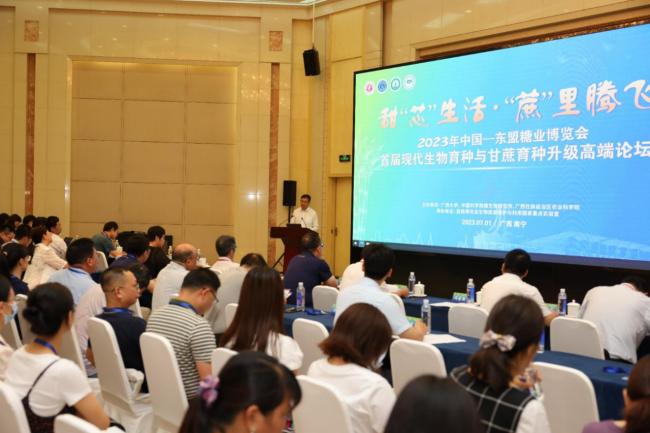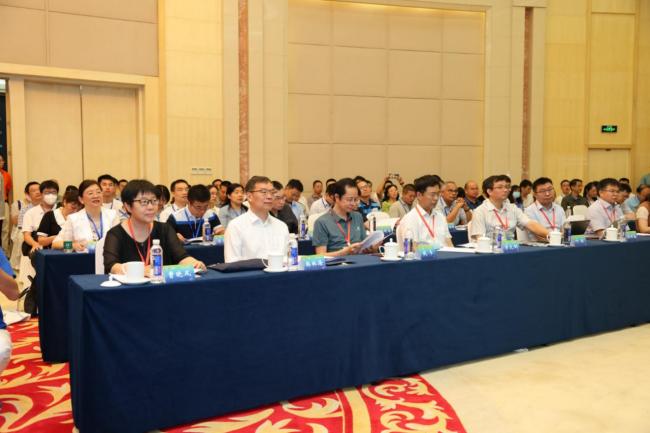On July 1st, in order to implement General Secretary Xi Jinping’s important discourse on scientific and technological innovation, and to discuss the latest developments in the field of biotechnology breeding as well as the ideas of biotechnology and mechanized breeding for sugarcane in Guangxi, the 1st Premium Forum on Modern Biotechnology Breeding and Sugarcane Breeding Upgrades was held at the Nanning International Convention and Exhibition Center in Guangxi. Attendees included Chen Xiaoya, a member of the Chinese Academy of Sciences and a researcher at the Center of Excellence for Molecular Plant Sciences, Chinese Academy of Sciences; Yang Weicai, a member of the Chinese Academy of Sciences and the director of the Institute of Genetics and Developmental Biology, Chinese Academy of Sciences; and invited researcher Cao Xiaofeng, who delivered his reports at the forum. Li Wengang, Secretary of the Party and Director of the Office for Sugarcane Industry Development of the Guangxi Zhuang Autonomous Region, Han Linhai, Deputy Secretary of the CPC Party Committee and President of Guangxi University, Qian Wei, Director of the Institute of Microbiology, Chinese Academy of Sciences, and Deng Guofu, Secretary of the Party Committee and President of the Agricultural Sciences Academy of the Guangxi Zhuang Autonomous Region, attended the forum and delivered speeches. Feng Jiaxun, Vice President of Guangxi University, presided over the opening and closing ceremonies of the forum.

Li Wengang introduced the general development of sugarcane seed industry in Guangxi and the main challenges it faces. He pointed out that exploring new directions in sugarcane breeding and improving the yield and quality of sugarcane is of great significance for ensuring stable and secure sugar supply. He expressed the hope that experts, scholars, business leaders, and professionals in the industry can collaborate and work together to plan and achieve the enhancement and optimization of sugarcane biotechnology breeding and mechanized breeding. This will make a more positive contribution to the development of the sugarcane industry in China and even the world.
Han Linhai introduced the collaboration and research overview between Guangxi University, the Institute of Microbiology of the Chinese Academy of Sciences, and the Agricultural Sciences Academy of the Guangxi Zhuang Autonomous Region in the field of sugarcane biotechnology breeding. He also highlighted the significant contributions made by the National Key Laboratory of Subtropical Agricultural Biological Resources Protection and Utilization in ensuring the safety of the sugarcane industry. He emphasized that Guangxi University always keeps in mind the “bigger picture,” firmly rooted in the land of Guangxi, and continuously strengthens its characteristics as a university in the “subtropical” region. Efforts have been made to cultivate expertise in sugarcane breeding, gradually developing into the only university globally involved in the entire sugarcane industry chain. He emphasized that Guangxi University has contributed its strength to the construction of a splendid Guangxi in the new era. He expressed his hope that the attending experts would speak freely, spark innovative ideas, and help solve the key scientific problems and core technological issues related to the risks faced by the sugarcane industry. He also sought guidance for Guangxi University, especially the Subtropical National Key Laboratory, to produce high-quality outcomes in sugarcane research, ensuring the high-quality and sustainable development of the sugarcane industry in China.
Deng Guofu introduced the development process and current research status of the Agricultural Sciences Academy, as well as the contributions of the Sugarcane Research Institute in the collection and preservation of sugarcane germplasm resources, the breeding and promotion of superior sugarcane varieties, and the assistance provided to sugarcane farmers in increasing their income and promoting rural revitalization. He expressed the hope that collaboration would continue to deepen with Guangxi University and other universities and research institutes, jointly promoting sugarcane biotechnology breeding, and contributing agricultural wisdom and strength to the high-quality development of the sugarcane industry in Guangxi.
Qian Wei stated that the era of sugarcane biotechnology breeding has arrived. It is necessary to utilize advanced breeding technologies to achieve a leap from 2.0 to 4.0 in sugarcane biotechnology breeding. Exploring the establishment of an innovative research platform that integrates government, industry, academia, research, and finance is crucial in promoting the high-quality development of the sugarcane industry under the new national system.

At the forum, six experts in the field of modern biotechnology breeding, (including Academician Chen Xiaoya, Academician Cao Xiaofeng, Academician Yang Weicai, Researcher Ye Jian, Researcher Zhang Yuebin, and Professor Zhang Jisen)delivered brilliant academic presentations focusing on the themes of “Modern Biotechnology Breeding” and “Upgrading of Sugarcane Breeding.” They shared advanced research experiences in biotechnology breeding, covering topics such as crop metabolic pathways analysis and nutritional quality improvement, forage breeding and soil improvement, and research on plant reproductive development and seed innovation. Additionally, they discussed the progress in utilizing technology to enhance sugar production capacity, the development of high-yielding and high-sugar sugarcane varieties, and the exploration of sugarcane genomics and molecular breeding, providing insights into the current status and future direction of sugarcane biotechnology breeding.
The attending scholars also engaged in in-depth discussions on the theme of “Key Technologies and Scientific Issues in Future Sugarcane Breeding,” focusing on the industrial and scientific problems related to sugarcane breeding, as well as the goals and development directions of future sugarcane breeding. They emphasized the need to address sugarcane industry issues through scientific means and improve breeding efficiency and variety quality in response to major challenges in industry development. They advocated the use of new technologies such as gene editing and whole-genome selection breeding to enhance sugarcane through collaborative improvements in traits such as high yield, high sugar content, disease resistance, strong perenniality, and suitability for mechanization. The integration of government, industry, academia, and research was encouraged, with the introduction of policies to promote the application and dissemination of superior varieties, ensuring the interests of the country, sugarcane farmers, and sugar enterprises, and advancing rural revitalization to guarantee national sugar supply security. The Subtropical National Key Laboratory has made significant contributions in the collection of sugarcane germplasm resources, fundamental biological research, and the breeding of new varieties. It was emphasized that the laboratory should shoulder its mission and responsibilities as a national key laboratory, further integrating scientific achievements with industry, and strive to become a leading international research and development center for sugarcane.
The forum was jointly organized by Guangxi University, the Institute of Microbiology of the Chinese Academy of Sciences, and the Agricultural Sciences Academy of the autonomous region. The National Key Laboratory of Subtropical Agricultural Biological Resources Protection and Utilization undertook the event. More than 170 representatives attended the forum, including delegates from Guangxi University, the Institute of Microbiology of the Chinese Academy of Sciences, the Agricultural Sciences Academy of the Guangxi Zhuang Autonomous Region, the Guangxi Liucheng Sugarcane Research Center, and relevant enterprises.
 Home
>
News & Events
>
News
Home
>
News & Events
>
News
 Home
>
News & Events
>
News
Home
>
News & Events
>
News




